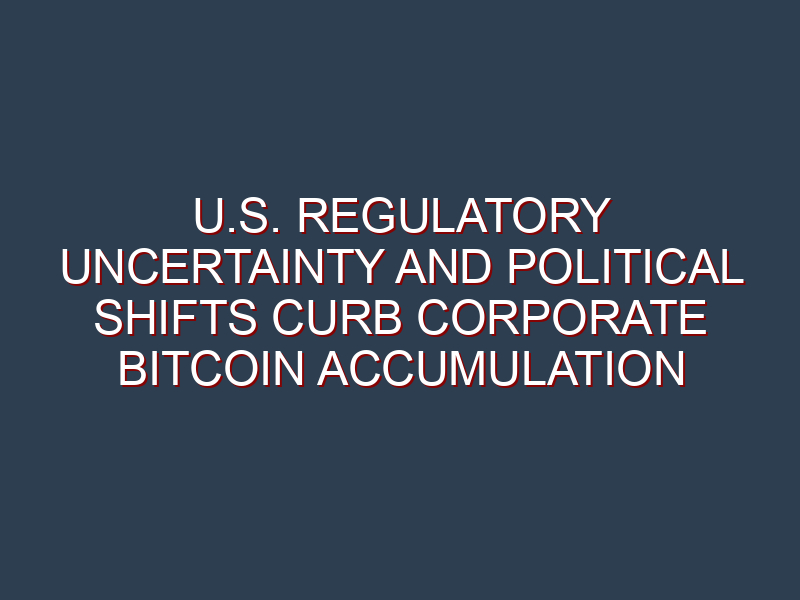Bitcoin’s Corporate Slowdown: What’s Driving the Change?
The once-booming trend of publicly traded companies, such as MicroStrategy and Tesla, boosting their balance sheets with Bitcoin holdings is hitting a political wall. Recent data shows a marked slowdown in this corporate Bitcoin accumulation, signaling not just a market adjustment but also a shifting political and regulatory landscape in Washington.
From Wall Street Darling to Policy Headache
Once embraced as a bold move for corporate treasuries, Bitcoin’s cachet among U.S. public firms is fading. This isn’t just about price volatility; it’s the direct result of mounting scrutiny from both Congress and federal regulators. The U.S. Treasury and agencies like the Securities and Exchange Commission (SEC) have intensified their focus on digital assets, framing Bitcoin less as a financial innovation and more as a potential risk to economic stability and national security.
Heightened rhetoric from Capitol Hill—driven by concerns over money laundering, tax evasion, and illicit finance—is making corporate boards think twice before adding more crypto to their books. Meanwhile, President Biden’s administration has signaled that stricter oversight is on the horizon, putting pressure on publicly traded companies to tread carefully.
The Political Calculus Behind Corporate Crypto
Why does this political pressure matter for Bitcoin supply? It’s simple: companies now face not only financial audits but also possible congressional hearings if their crypto bets sour or run afoul of government expectations. As lawmakers push for new regulations, such as the much-discussed bipartisan digital asset framework, CEOs are reassessing their risk exposure.
This retreat has a ripple effect far beyond Wall Street. As fewer treasury firms buy up Bitcoin, the supply available on the open market increases—undercutting narratives that institutional adoption would make Bitcoin perpetually scarce.
Regulators Take Center Stage
Behind the scenes, regulatory giants like the Commodity Futures Trading Commission (CFTC) and the SEC are jockeying for influence. Both agencies have issued guidance and enforcement actions targeting perceived vulnerabilities in the crypto sector. Their actions—and the uncertainty around who gets the final say—are causing headaches for companies hoping for clear rules of the road.
Until Congress delivers a unified digital asset law, the regulatory environment will remain a patchwork, complicating treasury strategies and making U.S. corporations more cautious about aggressive Bitcoin moves.
What’s Next: The Road to Clarity (or More Uncertainty)
For crypto advocates, the hope is that a new legislative framework could offer clarity and potentially revive corporate appetite for Bitcoin. But in a heated election year, crypto is fast becoming a partisan issue, with candidates using digital assets as a political football to score points on themes ranging from innovation to consumer protection.
One thing is clear: corporate America’s cooling interest in Bitcoin isn’t just a passing phase—it’s the result of political winds swirling through Washington. Until business leaders see signals of regulatory certainty from the Treasury, SEC, and lawmakers on Capitol Hill, the days of eye-popping corporate Bitcoin purchases may be on hold.





